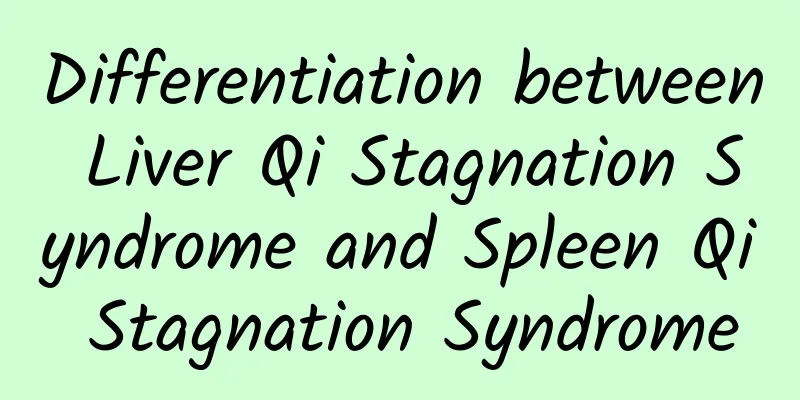Differentiation between Liver Qi Stagnation Syndrome and Spleen Qi Stagnation Syndrome

|
definition Liver Qi Stagnation Syndrome Symptoms of emotional frustration, liver dysfunction, and Qi stagnation. Common clinical symptoms include distension and pain in the chest, flanks, breasts, and lower abdomen, and irregular menstruation in women. Spleen Qi Stagnation Syndrome All symptoms are caused by food stagnation, or cold and dampness, dampness and heat blocking the Zhongwan, as well as emotional distress and liver depression invading the spleen, leading to stagnation of spleen earth. Common clinical symptoms include abdominal distension and pain, vomiting, and poor appetite. Causes Liver Qi Stagnation Syndrome Depression, melancholy and excessive worry will make the liver lose its smooth flow and flow, and the Qi will not be able to be released smoothly, resulting in liver Qi stagnation. Sudden mental stimulation, fear, and panic can also lead to qi stagnation. Liver diseases are often related to emotions. The liver is responsible for regulating the flow of Qi. Emotional damage often affects the liver's function of regulating Qi, resulting in many pathological changes. Spleen Qi Stagnation Syndrome Overeating and indigestion will cause food to stagnate in the Zhongwan area and obstruct the spleen. Or eating too much spicy and greasy food can cause dampness and heat, or being exposed to external cold and dampness can cause stomach stagnation and spleen stagnation. If the emotions are depressed, worries are not resolved, the liver fails to release, the spleen is injured and qi is blocked, which leads to qi stagnation. Therefore, "Yi Men Bu Yao" says: "People who are easily angry and think a lot, their emotions are often not smooth. Anger causes qi to be blocked in the liver, and thinking causes qi to be blocked in the spleen. Once they are infected with various diseases, the rise and fall of qi will be unbalanced, which will inevitably cause nausea, chest fullness, flank distension, and irritability." Pathogenesis Liver Qi Stagnation Syndrome The liver is a hard organ with a smooth and docile nature. It is responsible for regulating emotions, storing and regulating blood volume, and aiding the spleen and stomach in digestion and absorption. If the liver wood is stagnant, it will attack the spleen and stomach, and the spleen and stomach qi will not rise and fall properly, which can lead to epigastric pain. If the stomach fails to harmonize and descend, and the stomach qi goes against the flow, it will cause vomiting. If the Liver Wood Qi attacks the Spleen, the Liver and Spleen become unbalanced, the Spleen fails to function properly, the Clear Yang fails to rise, and the Turbid Yin fails to descend, then symptoms such as diarrhea, abdominal distension, and loss of appetite will occur. If the liver fails to function properly, the liver qi will go against the flow and attack the head along the meridians, also causing headaches. If due to emotional factors such as anger, shock, depression, etc., the Qi mechanism is blocked, the liver Qi is rebellious, the Qi goes up, and blocks the mind, then Qi fainting will occur: sudden fainting, unconsciousness, coldness of the extremities, etc. If Qi stagnation is not relieved, it will cause Qi reflux, and the reflux will cause hernia. If the liver qi stagnation syndrome is not relieved for a long time, the qi stagnation can often turn into fire, forming the liver fire inflammation syndrome. The fire evil consumes the yin and blood, which can easily lead to liver blood deficiency syndrome and liver yin deficiency syndrome. When the liver's yin and blood are insufficient and the yin cannot restrain the yang, the liver yang hyperactivity syndrome can appear. The hyperactivity of yang can cause wind, and the liver yang turning into wind can cause internal liver wind. If the liver blood and liver yin are insufficient, it may also cause wind due to blood deficiency and wind due to yin deficiency. In short, liver qi stagnation syndrome can lead to liver blood deficiency syndrome and liver yin deficiency syndrome, and is also the pathological basis of liver yang hyperactivity syndrome, liver fire inflammation syndrome and liver wind internal movement syndrome. Liver disease often invades other organs. For example, liver depression attacks spleen and earth; liver fire attacks lung and metal; liver yin deficiency often affects kidney essence deficiency, leading to liver and kidney yin deficiency; liver blood deficiency causes the liver to lose its storage function and the heart to lose its control, leading to heart and liver blood deficiency, etc. Among them, the most common is the liver qi rebellion that spreads to other organs. Spleen Qi Stagnation Syndrome The spleen is damp earth, which likes dryness and hates dampness. Both exogenous cold and dampness and endogenous damp heat can easily trap the middle earth, causing the spleen to lose its healthy function and leading to symptoms of qi stagnation, dampness obstruction and water retention. In addition, food stagnation and fluid retention in the middle burner can also lead to spleen stagnation and poor Qi movement. Spleen qi stagnation is also more likely to lead to the formation of pathological products such as phlegm, food accumulation, and water dampness. Because the spleen is responsible for transportation and transformation, the spleen can overcome dampness. If the spleen is trapped, transportation and transformation will be powerless, and food and water cannot be transformed into essence, but instead become phlegm, food stagnation, and dampness. “Dampness can damage the spleen. Once the spleen is deficient, a myriad of diseases will occur” ("Famous Doctors' Cases"). If the Liver is depressed and Qi is stagnant, it will attack the Spleen and Earth, causing the Spleen to lose its healthy function, then Qi stagnation and dampness will block the Spleen and Earth, causing symptoms of distension and fullness. Liver-Qi stagnation syndrome often affects the spleen's transportation and transformation function, that is, liver wood overcomes earth. If the spleen qi is stagnant, it will insult the liver, causing the liver to fail to discharge, that is, earth congestion insults wood. Liver-Qi stagnation syndrome and spleen qi stagnation syndrome can often affect each other, eventually leading to the pathological outcome of both liver depression and spleen congestion. Key points for identification Liver Qi Stagnation Syndrome Depression, irritability, distension and pain in the chest, flanks, breasts, and lower abdomen, pain in unknown location. Chest tightness, belching, sighing, or goiter in the neck, or accumulation of masses, or discomfort in the throat, blockage that cannot be coughed out or swallowed, no interference with eating, or abdominal pain during menstruation in women, irregular menstruation, or even amenorrhea, pale tongue with white coating, and wiry pulse. The clinical symptoms include emotional changes, bloating and pain in the areas where the liver meridian runs (chest, flanks, breasts, and lower abdomen), and menstrual disorders in women. Spleen Qi Stagnation Syndrome Abdominal distension, pain and distension, loss of appetite, nausea and vomiting, hiccups and belching, constipation or uncomfortable bowel movements, sticky stools, abdominal distension and pain during bowel movements, greasy tongue coating, and a stringy or slippery pulse. The clinical symptoms include abdominal distension and pain, vomiting, poor appetite, and greasy tongue coating.
Discriminant analysis Liver-qi stagnation syndrome and spleen-qi stagnation syndrome are both pathological manifestations of qi stagnation. Therefore, it has common symptoms such as abdominal distension and pain, belching, and stringy pulse. However, due to the different affected organs, the clinical manifestations vary. Liver Qi Stagnation Syndrome Frustration of emotions leads to stagnation of liver qi, which in turn causes dysfunction of qi movement and stagnation. The movement of Qi and its rise and fall, entry and exit require smoothness so that it can circulate continuously, reaching the internal organs and the skin. Once there is stagnation, the rise and fall will not function properly. If the Liver Meridian's Qi is stagnant, bloating and pain will appear in the chest, flanks, breasts, and lower abdomen where the Liver Meridian runs. And because the gathering and dispersion of Qi is irregular, the pain will move around and have no fixed location. Because the liver qi goes against the flow and attacks the stomach, the stomach loses its harmony and descends, and the stomach qi goes against the flow, thus causing belching. The liver likes to be smooth and submissive. If the liver is depressed and qi is stagnant, it loses its smooth, submissive and comfortable nature, causing depression, or even irritability. Poor emotional state can easily lead to liver qi stagnation, which often causes a state of depression due to the dysfunction of regulating emotions. Therefore, abnormal emotional activities can not only lead to internal organ diseases, but also be the external manifestation of internal organ dysfunction. When the liver qi is stagnant, the qi mechanism is unfavorable, and the qi flow is not smooth, sighing can disperse the stagnation, so people are good at sighing. When the liver qi is stagnant, the qi stagnation produces phlegm, and the phlegm and qi are blocked and beat in the throat, it is called plum pit qi. When the liver qi is stagnant, the blood vessels are blocked, and the qi is stagnant and phlegm is coagulated and beats in the neck, it will cause a goiter. In severe cases, qi is stagnant and blood is stasis, and the phlegm is coagulated, causing swelling, pain and hardness. When the liver qi is stagnant, qi disease affects the blood, and blood stasis forms inside the body, lumps can be seen in the abdomen. If blood stasis occurs and Chong and Ren meridians are out of balance, symptoms such as dysmenorrhea, amenorrhea, and irregular menstruation will occur. A pale tongue with white coating and a stringy pulse are signs of liver depression. Spleen Qi Stagnation Syndrome It is mostly caused by visible evil qi (food accumulation, water dampness, phlegm and fluid) and invisible qi stagnation, which block the middle burner, causing the spleen to lose its healthy function and the stomach to lose its harmony and descending function, resulting in digestion and absorption dysfunction. If dampness, phlegm, and food accumulation remain in the Zhongwan, Qi will stagnate and the Zhongjiao will be unable to transport and transform water and food, which will aggravate the accumulation of pathological products and cause fullness, stuffiness, and pain in the abdomen. : : : : : : : : : : : : : : : Greasy tongue coating and wiry or slippery pulse indicate phlegm and dampness, water retention, food accumulation, and qi stagnation. In terms of their clinical symptoms, although both liver qi stagnation syndrome and spleen qi stagnation syndrome have abdominal distension and pain, the former is due to the discomfort of the liver meridian qi, and also has symptoms of chest, flank and breast distension and pain; while spleen qi stagnation syndrome is due to the stagnation of solid evil in the middle burner, and only has abdominal symptoms, namely abdominal pain and symptoms of abdominal fullness. Although both of them have belching due to the failure of the stomach to harmonize and descend, the symptoms of digestive system dysfunction in simple liver-qi stagnation syndrome are not serious. In spleen-qi stagnation syndrome, the spleen and stomach are the exterior and interior of each other, coexist in the middle burner, and have many physiological connections and pathological influences such as reception and transportation, ascending and descending, and dryness and dampness helping each other. Therefore, the symptoms of digestion and absorption dysfunction are very prominent, not only manifested as belching, but also nausea, vomiting, hiccups (stomach qi goes up and moves the diaphragm), loss of appetite due to reception dysfunction, and symptoms such as qi stagnation in the stomach and intestines, dysfunction of descending and descending, and constipation. The dysfunction of the digestive system is significantly aggravated compared with liver-qi stagnation syndrome. However, the increase or decrease of emotional factors is very sensitive to the distension and pain in the chest, flanks, breasts, and lower abdomen as well as dysmenorrhea of liver qi stagnation syndrome. If you are in a good mood, the pain will be relieved, but if you are angry and depressed, the symptoms will be aggravated. The symptoms of spleen qi stagnation syndrome are often aggravated by food accumulation and dampness. In terms of pathogenesis and course, the main pathogenesis of liver-qi stagnation syndrome is the dysfunction of the liver's function of dispersing and discharging, the poor function of menstrual qi, the loss of the liver's smooth and compliant nature, and even qi disease and blood, qi stagnation and blood stasis, Chong and Ren imbalance, or qi stagnation causing phlegm, and obstruction of phlegm and qi; the main pathogenesis of spleen qi stagnation syndrome is manifested as the spleen being trapped by evil, losing its healthy function, qi failure to rise and fall, stomach failure to pass and descend, and liver-spleen imbalance. Both are positive syndromes, both are caused by qi stagnation, and both can present with symptoms of spleen and stomach dysfunction, but the spleen and stomach dysfunction in liver qi stagnation syndrome is the pathological outcome of liver depression and spleen deficiency, while the spleen and stomach dysfunction in spleen qi stagnation syndrome is the pathological manifestation of the disease affecting the organ and evil qi trapping the spleen. In the syndrome of liver qi stagnation, the disease is located in the liver, which can often affect the spleen and stomach. In the syndrome of spleen qi stagnation, the disease is mainly located in the spleen and stomach. Regarding the causes and medical history of the liver-qi stagnation syndrome and spleen-qi stagnation syndrome, the former is mostly caused by emotional factors such as emotional frustration, depression, anger, sudden mental stimulation, etc., so there is a history of depression and melancholy; the latter is caused by irregular diet, overeating, food stagnation, or cold and dampness, dampness and heat in the spleen and stomach, or the pathological products of fluid stagnation and dampness obstruction accumulate in the middle burner, or liver depression and spleen, liver-spleen disharmony and other factors, thus forming spleen-qi stagnation syndrome. For the syndrome of liver qi stagnation, the clinical treatment should be to soothe the liver and relieve depression, regulate qi and relieve pain. The prescription used is Chaihu Shugan San (Jingyue Quanshu). For spleen qi stagnation syndrome, the treatment should be to relieve depression and remove stagnation, strengthen the spleen and eliminate accumulation. The prescription is Zhishi Daozhi Pills (Discussion on Discriminating Internal and External Injuries). Therefore, Yizhi Xuyu says: "Earth stagnation takes it away. Earth stagnation means spleen stagnation. To take it away means to remove it. ... For example, if the abdomen is blocked, very full and full, take Zhishi Daozhi Pills, Muxiang Binglang Pills, and Chengqi Decoction to remove it. This is to purge the fullness in the middle. If eating and drinking hurt the spleen, there will be fullness and stuffiness, and phlegm will be produced every day. Take Juban Zhishu Pills. If there is fullness and stuffiness due to worry and worry, loss of appetite, and slight tightness in the abdomen, take Muxiang Huazhi Decoction and Xiaopi Pills to eliminate and grind it, which is also the meaning of removing it. |
<<: Kidney deficiency and nephritis are different diseases
>>: Diet therapy for constipation
Recommend
How to do painless electronic colonoscopy
Colonoscopy is quite painful because when inserti...
What are the early symptoms of cerebral edema?
Cerebral edema is an increasingly common disease,...
Treatment of hypothyroidism edema
Hypothyroidism is a decrease in thyroid function,...
What happens if you get stung by a wasp?
Hornets are a type of bee, but there are some dif...
What should I do if there is a lump on the left side of my uterus?
Many women will have a lump in the left abdomen o...
Rehabilitation methods for lumbar muscle strain
Lumbar muscle strain is quite common in our daily...
What causes itchy skin when running?
Running to lose weight is the first choice for ma...
The harm of surgical anesthesia to the human body
Anesthesia is an indispensable step in the surgic...
How to cook crab stewed with wine and its efficacy
Although crabs are delicious, few people cook the...
Effects of Stone Frog
The stone frog is what we usually call the stone f...
The difference between stretch marks and cellulite
Stretch marks and cellulite are both common lines...
How effective is CyberKnife treatment?
Everyone knows that if you have cancer, your life...
How to lose weight with winter melon and red dates?
Winter melon is a very common ingredient and is v...
What is the disease of glans cauliflower
Cauliflower-shaped diseases are generally related...
What are the effects and functions of chicken gizzard lining
Chicken is a common meat in our daily life, and i...









